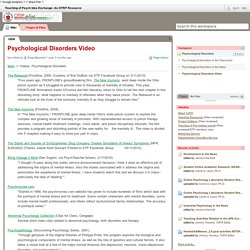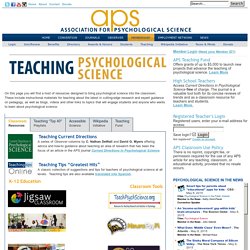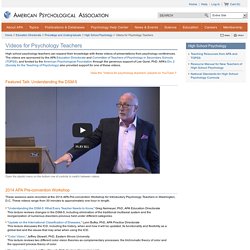

BBC Bitesize - GCSE Sociology. @TheSocyCinema - Videos. Great Films for Sociology Classes - Citings and Sightings. UPDATE: In January 2012, we caught up with Jessie Daniels for her latest picks in the best of the best documentaries, and got replies from several other professors representing different courses.

Please check out the new lists! Here are more items suggested by the commentors: Josh Page, a professor of sociology (particularly law, crime, and deviance) at the University of Minnesota, sends in his Top Five list for teaching undergrad courses on the criminal justice system, noting “The ‘reality’ TV stuff about prison life is pretty much uniformly bad.”Top Five Prison Documentaries for Crime and Punishment Courses1. Sweethearts of the Prison Rodeo (2009) 2. The Dhamma Brothers (2008) 3. Another great friend of The Society Pages, Prof. Nathan Palmer shares:This is such a great idea and I’d like to thank TSP and Jessie Daniels for doing this. Carolyn Liebler says:I often use movie clips in introduction to sociology when introducing a set of theories or concepts. Link to the list… An Introduction to Sociology. Sociology Videos. Psychology Home.
OpenStax CNX. Free Psychology Video Lecture courses. Teaching of Psych Idea Exchange: An OTRP Resource / Psychological Disorders Video. Main -> Videos: Psychological Disorders The Released (Frontline, 2009; Courtesy of Bob DuBois via STP Facebook Group on 3/11/2013) "Five years ago, FRONTLINE's groundbreaking film, The New Asylums, went deep inside the Ohio prison system as it struggled to provide care to thousands of mentally ill inmates.

This year, FRONTLINE filmmakers Karen O'Connor and Miri Navasky return to Ohio to tell the next chapter in this disturbing story: what happens to mentally ill offenders when they leave prison. The Released is an intimate look at the lives of the seriously mentally ill as they struggle to remain free. " The New Asylums (Frontline, 2004) In "The New Asylums," FRONTLINE goes deep inside Ohio's state prison system to explore the complex and growing issue of mentally ill prisoners. The Sights and Sounds of Schizophrenia: Drug Company Creates Simulation of Illness' Symptoms (NPR, 8/29/2002) (Thanks Jeanie Kent Duncan! Bring Change 2 Mind (Dan Segrist, via PsychTeacher listserv, 2/17/2010) Mr. Web Gems: 10 Great Short Clips That Illustrate Psychological. Must Watch Psychology Videos. The best psychology videos for lesson planning and studying. Out on a Limb - A Guide to Getting Along.
Teaching Psychology - Association for Psychological Science. Teaching Current Directions A series of Observer columns by C.

Nathan DeWall and David G. The Science of Addiction: Genetics and the Brain. GoCognitive. NeuroPsyFi - NeuroPsyfi brain science behind the movies. Beginnings in Psychological Science. PsyBlog. American Psychological Association (APA) Learn Psychology Online for Free with Our Huge Collection of Open Courses. The subject of Psychology is becoming more and more important in today’s world, as both the prevalence and the recognition of mental illness has increased.

However, with psychologists can utilize their knowledge in a variety of areas outside of helping people that need it, including selling products (marketing), helping relationships/marriages, or counseling those who have gone through traumatic experiences, such as our veterans. These are just a few of the many things that Psychologists can bring to the table.. Free psychology information is easy to find yet much of what you find not be worth your time. We’ve put together a list of psychology courses from well-respected institutions such as Yale, MIT, Stanford, and Harvard.
Hopefully, this free resources will help you advance your knowledge of psychology to better understand how the mind works, and what drives us, as well as how to help people. MOOCs MOOCs are Massive Open Online Courses. Resource Manual for New Teachers of High School Psychology. Videos for Psychology Teachers. These sessions were recorded at the 2014 APA Pre-convention Workshop for Introductory Psychology Teachers in Washington, D.C.

These videos range from 30 minutes to approximately one hour in length. “Understanding the DSM-5: What Every Teacher Needs to Know,” Greg Neimeyer, PhD, APA Education Directorate This lecture reviews changes in the DSM-5, including elimination of the traditional multiaxial system and the reorganization of numerous disorders previous held under different categories. “Update on the International Classification of Diseases,” Lynn Bufka, PhD, APA Practice Directorate This lecture discusses the ICD, including the history, when and how it will be updated, its functionality and flexibility as a global text and the issues that may arise when using the ICD. Teaching High School Psychology. There has been a lot (a LOT) of chatter in the AP Psych community about the implications of the change from DSM IV TR to DSM 5.

Depending on who you listen to, the impact is either HUGE or little. Here's the "official word" from College Board: "The fifth edition of the Diagnostic and Statistical Manual of Mental Disorders (DSM-5) was published in May 2013 with revisions to the criteria for the diagnosis and classifications of mental disorders.Beginning with the 2015 AP Psychology Exam, all terminology, criteria and classifications referred to among multiple-choice and free-response items will adhere to the new fifth edition of the Diagnostic and Statistical Manual (DSM-5).
" That's a nice, clear message, but based on email/twitter/AP Central discussion board chatter, many AP teachers seem to disagree about how big a deal this change will be in terms of items on the exam. Please chime in the comments section and let us know what you're doing, if anything, regarding DSM 5 in your classrooms. Online Psychology Laboratory - Welcome.